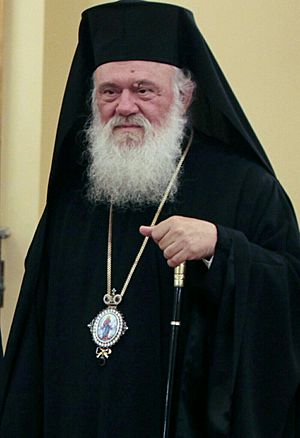Ieronymos II of Athens facts for kids
Quick facts for kids His Beatitude Ieronymos II |
|
|---|---|
| Archbishop of Athens and All Greece | |

Ieronymos II in 2009
|
|
| Native name | Ιερώνυμος B΄ |
| Church | Church of Greece |
| See | Athens |
| Enthroned | 7 February 2008 |
| Predecessor | Christodoulos |
| Orders | |
| Ordination | 10 December 1967 |
| Consecration | 4 October 1981 |
| Personal details | |
| Birth name | Ioannis Liapis |
| Born | 30 March 1938 Oinofyta, Boeotia, Kingdom of Greece |
| Nationality | Greek |
| Denomination | Greek Orthodoxy |
| Previous post | Metropolitan of Thebes and Levadeia (1981–2008) |
| Alma mater | University of Athens University of Graz University of Regensburg University of Munich |
| Signature | |
Ieronymos II (born on March 30, 1938) is a very important leader in the Church of Greece. He is the Archbishop of Athens and All Greece. This means he is the main leader, or primate, of the Orthodox Church in Greece. The Church of Greece is Autocephalous, which means it is independent and has its own head. He was chosen for this role on February 7, 2008.
Before becoming Archbishop, Ieronymos held several important positions. He worked as a Protosyncellus (a senior assistant to a bishop) for the Metropolis of Thebes and Livadeia. He was also an abbot (the head of a monastery) at two monasteries. Later, he became a Secretary for the Holy Synod of the Church of Greece. The Holy Synod is like the main council that makes decisions for the Church.
In 1981, he became a Metropolitan Bishop for the areas of Thebes and Levadeia. He also wrote two important books about historical Christian sites.
Contents
Early Life and Education
Ieronymos was born in a place called Oinofyta in Boeotia, Greece. His family has roots from the Arvanite people.
He studied at the University of Athens, where he earned degrees in archaeology (the study of old things), Byzantine studies (the study of the Byzantine Empire), and theology (the study of religion). He continued his studies at universities in Graz, Regensburg, and Munich.
After his studies, he taught Christian archaeology for a short time. He also worked as a teacher of languages at a school called Lycée Léonin. In 1967, he became a deacon and then a presbyter (a priest) in the Orthodox Church.
His Official Titles
| Styles of Archbishop Ieronymos II of Athens |
|
|---|---|
 |
|
| Reference style | His Beatitude |
| Spoken style | Your Beatitude (Makariótate), Déspota |
| Religious style | Archbishop |
The full official title for the Archbishop of Athens and All Greece is:
His Beatitude Ieronymos II, Archbishop of Athens and All Greece
In Greek, this title is:
Η Αυτού Μακαριότης ο Αρχιεπίσκοπος Αθηνών και Πάσης Ελλάδος Ιερώνυμος Β'
Church Work and Leadership
Ieronymos has had a long career serving the Church. He was a senior assistant in the Metropolis of Thebes and Livadeia. He also led the monasteries of Transfiguration of Sagmata and Hosios Loukas. He served as a Secretary, and later the main Secretary, for the Holy Synod of the Church of Greece.
In 1981, he was chosen to be the Metropolitan Bishop of Thebes and Levadeia. Besides his church duties, he continued his work in Christian archaeology. He published two important books: "Medieval Monuments of Euboea" in 1970 and "Christian Boeotia" in 2006.
On February 7, 2008, Ieronymos was elected as the new Archbishop of Athens and All Greece. He officially started his duties on February 16, 2008.
Views on Society
Ieronymos has spoken out on important social issues. In 2012, he criticized racism, antisemitism, and Islamophobia. He also spoke against the Golden Dawn political party. He stated that "The church loves all people, including those who are black, white or non-Christians." This shows his belief in treating everyone with love and respect.
On April 16, 2016, he visited the Mòria refugee camp on the island of Lesbos. He went with Pope Francis and Ecumenical Patriarch Bartholomew I. Their visit helped to bring attention to the refugee crisis happening at that time.
In February 2024, when a new law about marriage was passed in Greece, he expressed his disagreement with it.
See also
 In Spanish: Jerónimo II de Atenas para niños
In Spanish: Jerónimo II de Atenas para niños
 | Valerie Thomas |
 | Frederick McKinley Jones |
 | George Edward Alcorn Jr. |
 | Thomas Mensah |

